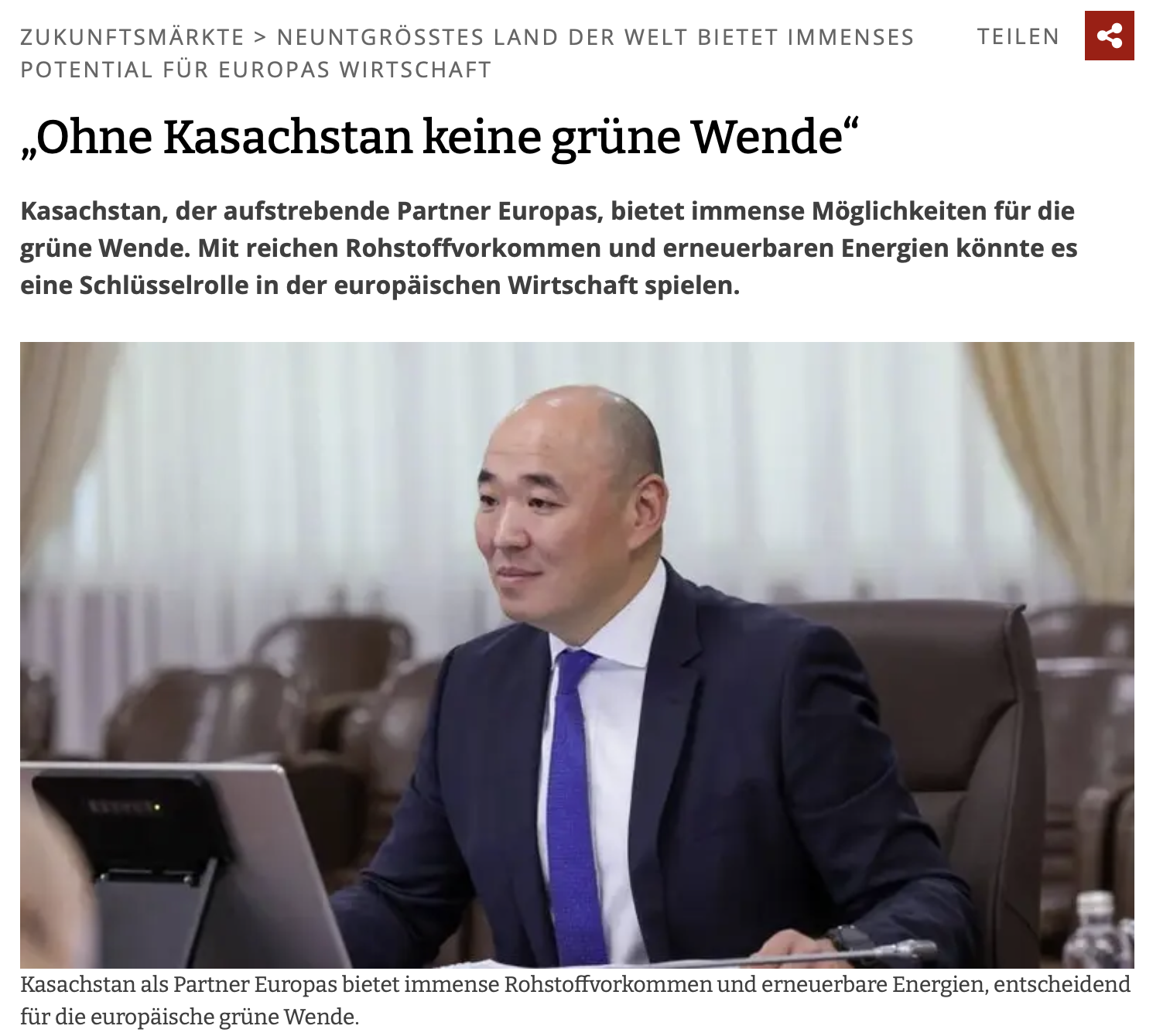ASTANA – Kazakhstan is a reliable and secure raw material partner for Germany and Europe and can significantly contribute to achieving the goals of Europe’s Green Deal, said Minister of Industry and Construction Kanat Sharlapaev in an interview with German magazine Markt und Mittelstand.

“Kazakhstan has become one of the most important oil suppliers for Germany. Our country also has immense potential to increase Germany’s supply of traditional energy resources such as gas and to produce and subsequently export green hydrogen on a large scale,” said the Kazakh minister.
Kazakhstan also possesses substantial deposits of critical and strategic raw materials, including rare earth elements, which are crucial for the energy transition and chip manufacturing.
Sharlapaev emphasized that Germany and Europe could rely on Kazakhstan as a secure partner for these raw materials. He noted the huge demand for raw materials, which will continue to grow as countries worldwide aim at net zero emissions.
“In order to achieve net zero emissions worldwide by 2050, the global demand for mineral raw materials will be six times higher by 2040 than it is today. For example, a typical electric car requires six times more minerals than a conventional car and the construction of an on-shore wind turbine requires nine times more minerals than a gas-fired turbine,” said Sharlapaev.
Without Kazakhstan, there can be no green transition
In April, the European Union launched the Minerals Security Partnership Forum, which will serve as a platform for cooperation in critical raw materials. Kazakhstan, Namibia, Ukraine, and Uzbekistan also joined the initiative.
Sharlapaev sees Kazakhstan’s inclusion as a move to strengthen its relations with Central Asia and diversify its supply sources for critical and strategically important raw materials.
Such cooperation is critical for the economic prosperity and security of both sides.
“Part of the solution, especially for the digital, energy and mobility transition of the European economy, lies in our country’s soil,” said Sharlapaev.
Speaking specifically, the minister indicated that Kazakhstan has more than 8,000 deposits of over 100 different minerals. With appropriate exploration, another 5,000 deposits are expected to be discovered. Their total value alone is estimated at $46 trillion.
There are other solid minerals, including iron, gold, copper, uranium, zinc, molybdenum, tungsten, manganese, gold, and aluminum.
According to Sharlapaev, Kazakhstan holds 63% of the world’s tungsten reserves, 48% of chromium reserves, and 14% of uranium reserves.
“Overall, Kazakhstan extracts 18 of the 34 raw materials classified as critical by the EU in the recently presented Critical Raw Materials Act. Without Kazakhstan, there can be no green transition,” he said.
Logistics
Addressing the transportation of these resources, particularly in a turbulent geopolitical landscape, is vital. The minister reaffirmed Kazakhstan’s commitment to making the supply of goods and raw materials to Europe more secure and sustainable.
The Trans-Caspian International Transport Route is one way to do so. The sides involved in the development, including the EU, recently reached a milestone by launching a joint coordination platform in Astana.
“The Trans-Caspian Transport Corridor, which is being promoted by the European Union and others as a sustainable transport route, is intended to transport raw materials and other goods between Central Asia and Europe in less than 15 days, bypassing Russia and Iran. At the same time, the project is also intended to serve as a corridor for knowledge exchange and innovation between Europe and Central Asia. So a lot is happening in Central Asia,” he said.
What makes Kazakhstan attractive?
There is more of what makes Kazakhstan attractive to European investors. The areas with substantial yet untapped potential include renewables and agriculture.
“In addition, we are now very interested not only in extracting these raw materials more sustainably but also in processing them in our own country, possibly right through to end products such as battery production,” he said.
“Additionally, there is significant potential to develop new logistical routes and production facilities. There are many opportunities here for German logistics companies, agricultural and construction firms, and specialists in foreign mining to get deeply involved,” he added.
Sharlapaev said Kazakhstan “did the homework” in making the business climate more favorable.
“We have done our homework, reforming laws, improving the licensing system, simplifying business registration, and optimizing state control and supervisory activities. Additionally, an extensive program aims to privatize more than 900 state-owned enterprises in the coming years,” said the minister.
At least 600 joint ventures with German capital are registered in Kazakhstan, including giants Metro, Knauf, Heidelberg Materials, BASF, Linde, Obi, and Claas.
The key sectors in which German companies operate are construction, trade, industrial manufacturing, and mining.
“In addition to modern and digital infrastructures, they all benefit from our favorable investment climate. There are 14 special economic zones [SEZ] in Kazakhstan for this purpose, which also offer tax and customs concessions, such as exemption from corporation tax, land tax, property tax, VAT for goods consumed in the SEZ, and a free land lease for ten years. There is still plenty of room for German and European companies here, which we will welcome with open arms and, incidentally, with a well-trained skilled labor market,” he said.
